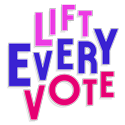Automatic Voter Registration
Automatic Voter Registration
The U.S. is the only big democracy in the world that puts the burden of voter registration and updates, on citizens— and then blames them when the voter rolls are inaccurate.
Wouldn’t it be great if, when you went to update your driver’s license or ID after you move, your state would update your voter registration, without you having to do anything?
That’s what 24 states, plus Washington, D.C, already do, using bipartisan laws that make it easy to vote, and hard to cheat. Lift Every Vote teaches citizens about this common sense solution, which eliminates red tape and eliminates hassles for voters, and saves election officials’ time. It also saves taxpayer money: processing an electronic registration costs about 1/30th of the price of processing a paper registration.

If you live in a state without AVR, and want to help your state officials learn about it, fill out our form in the footer! We’re happy to help.
What’s Automatic Voter Registration?
How many voter registration forms have you filled out? Probably more than you’ve wanted to. But there’s an easier way for Americans to register, or move their registration. Citizens who interact with state agencies (like a Departments of Motor Vehicles, Health, or Labor) are automatically registered or updated. Registration is the default, but it’s not compulsory—if you don’t want to be registered, you can easily opt-out.
AVR makes it easier to vote and harder to cheat.
The biggest reason that states’ voter rolls are inaccurate is that when voters move or die, officials often don’t know. AVR uses the data states already have (for example, an updated driver’s license, state ID, or medicaid card—to keep its voter rolls updated. It ensures that eligible citizens are registered, and outdated registrations are deleted.
Each paper registration costs almost 30 times more than an electronic one.
Nationwide, tens of millions of paper voter registrations are processed every year. They’re expensive, and they exhaust election officials. Replacing our outdated paper-based system with a modern one eliminates wasteful red tape and saves taxpayers millions of dollars.

